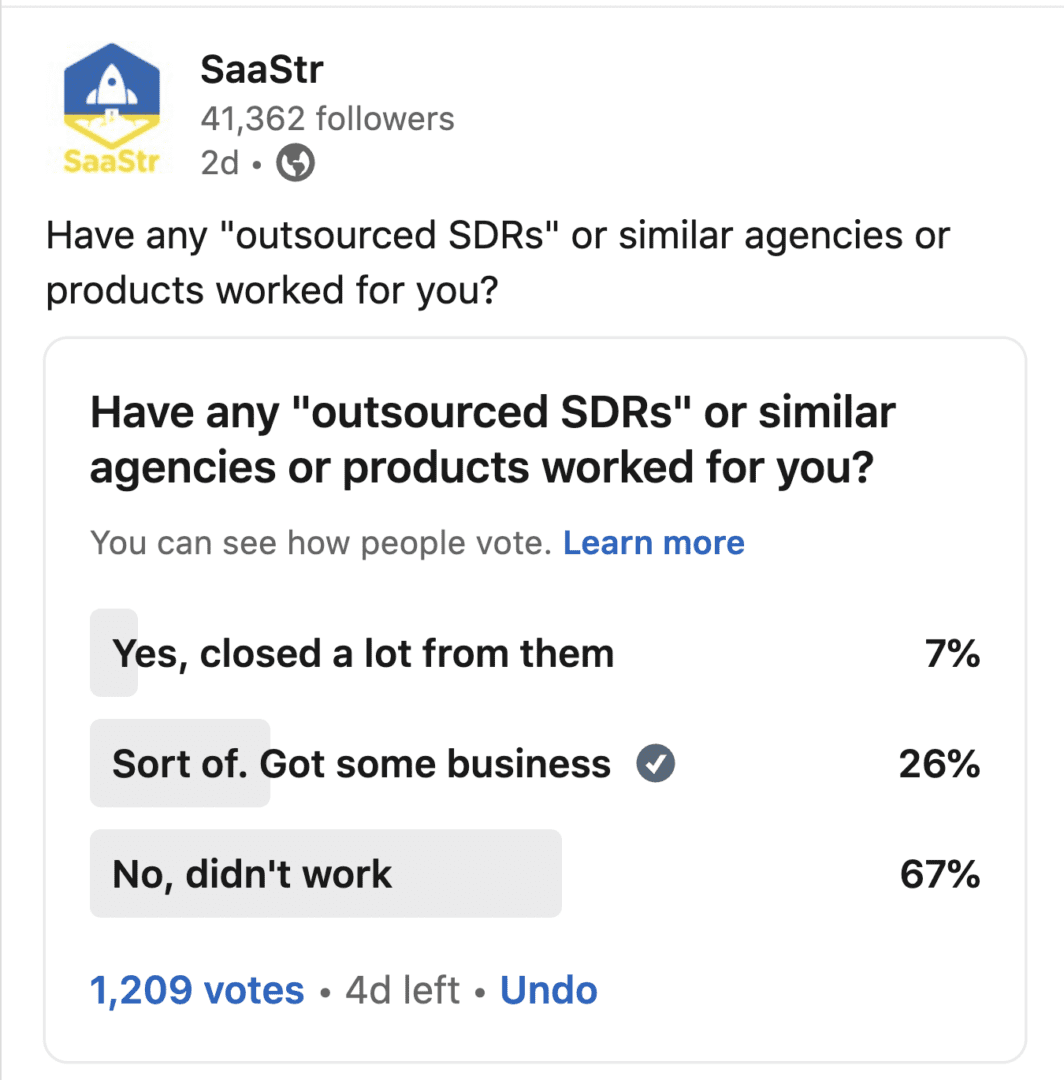Only 7% of You Have Really Gotten Outsourced SDRs to Work
And How Snowflake Manages 100+ SDRs Across 4 Continents
So a recent SaaS survey confirmed what I’ve experienced over the year: outsourced SDRs are tough to make work.
It would be so great if we could all outsource sales, sales development, sales operations, and more. It really would be great. It’s just hard in practice to outsource something you don’t already know well yourself.
Personally, I’ve seen it sort of work a few times — and that’s why I added “sort” as an option, and 26% of you also said it had sort of worked:
We used an experienced outsourced team at SaaS itself to bring in new sponsors, and they added about 8% of new revenue. Worth it, but the margins were lower than core customers, and it took up a lot of bandwidth.
I’ve invested in 2 startups that micromanaged outsourced SDR teams to some success. They managed the resources, wrote the scripts, reviewed the lists, etc. Still, neither stuck with those agencies after 4-6 months.
But what I personally haven’t seen is an outsourced SDR team replace an in-house one. It would be great if it could, especially given the high turnover rate in SDRs. I just haven’t yet seen it work.
It’s hard to outsource your core, especially when there are so, so many competitors on the market.
And a few great insights from others in the comments:
“IMO, if you’re going to hire and outsourced BDR team, they either need to 1. Specialize within your market Or 2. Use them exclusively for inbound qualification”
— Kevin Kost, Director CS, GrammaTech
“Yes and no….very dependent on product complexity and buying cycle….would argue as a quick fix / extra focus on opening up a new region / segment, it’s viable (and has been) provided sufficient enablement tools are in place (to allow for clear targeting / messaging) with regular oversight / value prop re-calibration. Negative – in case of seasonal cycles or very sudden changes to market condiitions, it’s harder to quickly pivot external resources. Long term, there’s no substitute to internal…who are part of your culture, have real-time access to cross functional information etc.”
— Marcus Kingsley, VPS, SchoolStatus
“Hasn’t worked for us, and we’ve trialed a number of well-managed, diligent organisations. For a high AOV and a complex product, there is no substitute for having your own team and investing in their expertise in the product and ICP over time.”
— James Rehm COO, Skuuudle
“Pre-pattern is brutally hard as it requires so much iteration/lock picking. even then. stage/vertical/solution dependent etc”
— Ben Virdee-Chapman, VPM, Gig Wage
“Hard for B2B saas, where the solution is geared towards solving sophisticated customer workflows. Customers expect more product knowledge, even at the appointment setting engagement.”
— Eric Harrington, Co-Founder, TeamSupport.com
“The interesting thing about this question is most of the people who pay to outsource SDRs are usually the same people who have not figured out how to make the SDR model work for them internally. I’ve actually never seen a company that’s cracked the outbound model then switch to outsourcing it… because why would they?
So really the question is; have SDRs worked for you? If yes, have outsourced SDRs worked for you? It’s like trying to hire a sales team before the CEO proves the sales model themselves. Rarely works ”
— Colin Cadmus, ex-VPS, Aircall
——-
OK i know a lot of folks will disagree here, like they do on Fractional CROs and CMOs and similar targets. Especially folks that provide these services. I’m just sharing my learnings. And those of the 1,200+ from the survey above.
I have had some success myself in general outsourcing core functions — but only when I’d already done them well myself, and only when I treated the outsourced resources as part of the core team. Including coming to team meetings, a long-term commit, etc.
And a really great session with Snowflake’s VP of Global Sales on how they manage 100+ SDRs across the world here:

